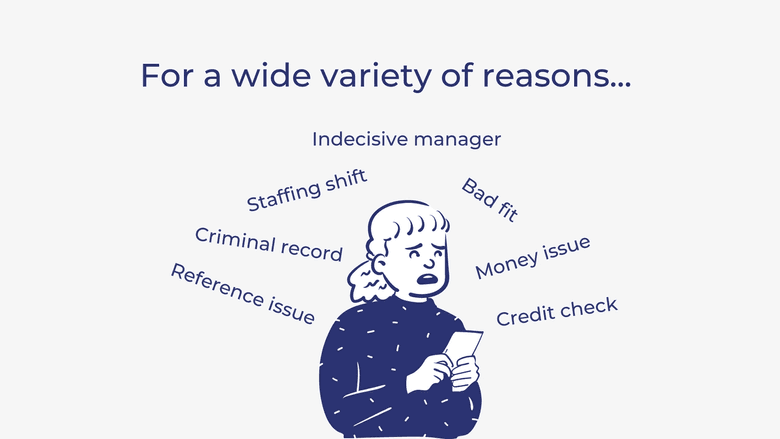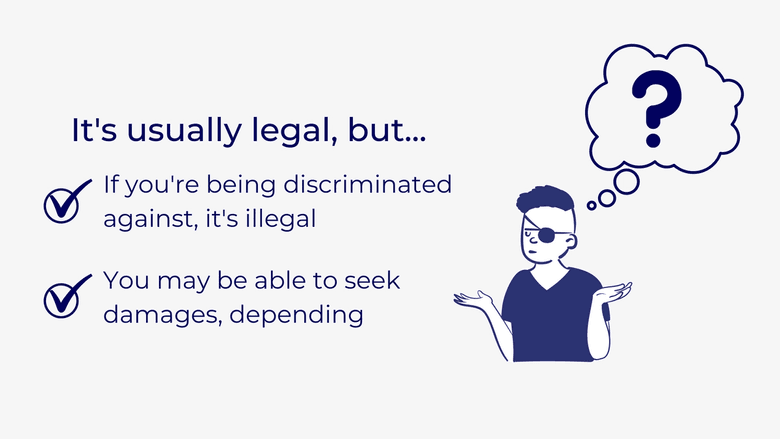Your offer is rescinded - what happens next?
Offers get rescinded rarely, but usually for a good reason. In most cases, consider it a blessing in disguise. Here, we explain how to handle it.
As a hiring manager, I have rescinded offers several times and I didn't feel bad about it. But things are different now in COVID-19. While in a manager's career this is something that should happen super rarely - now it's happening broadly across a variety of roles. Why?
Before COVID-19: Most of the time, after extending an offer, something happened with the candidate that was a massive red flag. Taking the offer back was the only reasonable recourse to save the team the agony of introducing someone who is a poor fit and save me from likely firing this person six months later. Even after 10 rounds of interviews, sometimes you make a mistake. It's not great for the candidate and it can be massively unfair, but it's important to be honest off the bat and set things straight.
After COVID-19: Now, things have changed. Companies are rescinding not due to a poor fit, but because of the lack of budget. If this has happened to you, I'm sorry. I fully understand that it can feel disarming and unfair. But it's important to note that there's usually a reason behind it - and sometimes, especially in times like these, it can save you some heartache down the line. If the company didn't have money to hire to begin with, they likely wouldn't be in better shape when it came to raises and performance reviews.
Why Did the Company Do It?

Bad fit, manager getting cold feet, not worth the salary they negotiated, department being dissolved, financial issues with the company, something came up in your background check - these are all things that would honestly make your life hell had you taken the job. Employers can rescind an offer for virtually any reason but a discriminatory one.
In COVID-19, we're seeing companies re-shuffling priorities virtually, and sometimes you might be at the finish line when the offer is pulled. In fact, I've even spoken with people who even signed and were about to start when the offer disappeared. It sucks, it's not fair - but it's better to find a company who can afford you and your growth from the beginning.
I Already Took the Job, Is It Legal for Them to Take My Offer Back?

All states (except for Montana) have something called employment-at-will. This means both you and your employer can terminate the contract with no reason given at any time. There are two things here I want you to know:
- You cannot be terminated based on a discriminatory reason, like race or religion
- In some cases, you can seek damages. Ask your Candor mentor to connect you with a legal advisor
Every job offer contract comes with "contingencies". These are loopholes your employer puts in to be able to terminate the contract with no recourse. For instance, if you fail a criminal background check or credit check or have issues with your references - this makes it easy for you to lose your contract even if you signed already.
(If adverse action is taken against you based on your credit report, you are entitled to a free copy of the report that was used. Please take advantage of that)
If there is something in your background that can be an issue - speak up. Most commonly in tech, we see candidates feel insecure about not attending college and sometimes even purchasing a fake degree (the dark web is not your friend) or claiming they graduated when they dropped out. If you're a gifted engineer or data scientist, or if you've already had some career accomplishments, rest assured that no one cares if you graduated. You're only hurting yourself by lying. It's truly not worth it.
Separately, it's also important to note another case - negotiation. Every time you negotiate an offer, you are legally "rejecting it" and the employer is not bound to counter you. It is extremely unlikely this would result in an offer withdrawal unless you are rude or offensive in the way you negotiate.
Lastly - your job offer and your employment contract are usually two different things at a larger company (this may be the same at a startup). Be wary of that.
Can I Seek Damages?

Sometimes. The legal concept of “promissory estoppel” protects you from harm you might have incurred from the offer being withdrawn, but it does have to be both substantial and well documented. Some examples:
- If you incurred significant expense moving your family across the country for this job, then you likely have some legal recourse here.
- If you left your job for this new opportunity and you cannot reverse your resignation then you may have some resource since you may have suffered lost wages, benefits, opportunities for promotion, etc. due to leaving.
Otherwise, you might be able to keep the signing bonus, but that's about it.
It's important to note that you probably can't file for unemployment since most states have requirements of how long you've been with a company before you can get benefits.
The information provided herein is for general informational purposes only and is not intended to provide tax, legal, or investment advice and should not be construed as an offer to sell, a solicitation of an offer to buy, or a recommendation of any security by Candor, its employees and affiliates, or any third-party. Any expressions of opinion or assumptions are for illustrative purposes only and are subject to change without notice. Past performance is not a guarantee of future results and the opinions presented herein should not be viewed as an indicator of future performance. Investing in securities involves risk. Loss of principal is possible.
Third-party data has been obtained from sources we believe to be reliable; however, its accuracy, completeness, or reliability cannot be guaranteed. Candor does not receive compensation to promote or discuss any particular Company; however, Candor, its employees and affiliates, and/or its clients may hold positions in securities of the Companies discussed.
